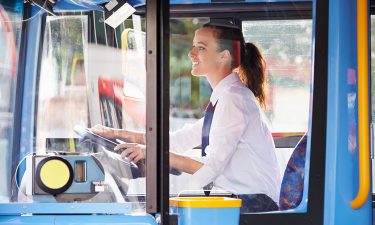COVID-19 – the challenges faced by women working in transport
- Like
- Digg
- Del
- Tumblr
- VKontakte
- Buffer
- Love This
- Odnoklassniki
- Meneame
- Blogger
- Amazon
- Yahoo Mail
- Gmail
- AOL
- Newsvine
- HackerNews
- Evernote
- MySpace
- Mail.ru
- Viadeo
- Line
- Comments
- Yummly
- SMS
- Viber
- Telegram
- Subscribe
- Skype
- Facebook Messenger
- Kakao
- LiveJournal
- Yammer
- Edgar
- Fintel
- Mix
- Instapaper
- Copy Link
Posted: 9 September 2020 | Jo Field - Women in Transport | No comments yet
Jo Field, Board Member of Women in Transport, talks to women working in the transport sector about their experiences through the COVID-19 pandemic.


COVID-19 has had a massive impact on everyone’s lives in one way or another over the past few months. Many have faced the challenge of adjusting to home working after working in bustling offices for so long. Others found they simply didn’t have a job to go to as restaurants, hairdressers and shopping centres had to temporarily close and staff were furloughed.
But others, who provide essential services such as healthcare workers, supermarket staff, and transport workers, had to carry on with business as usual. But has it really been business as usual?
We’re all well aware of the challenges faced by healthcare workers as intensive care units were flooded with COVID-19 patients, and supermarket staff who had to adapt to social distancing in stores and restricting the number of customers allowed in. But how has this affected those who work in transport? And in particular, how has it affected women who work in transport?
Many women on the frontline found themselves working increased hours and having to keep up with a constant pace of change
In this article, we take a look at women who work in transport, their experiences of working through the COVID-19 pandemic, and how they see things changing in the industry as a result.
We heard from several women who work within transport, both on the frontline and behind the scenes. COVID-19 affected most in one way or another.
A typical day


Many women on the frontline found themselves working increased hours and having to keep up with a constant pace of change. But while this was initially a challenge, they felt happy to be useful and knew that if they were having a ‘bad day’ their colleagues and managers would always be supportive.
Those with office-based roles noted various challenges and opportunities from working remotely. Some women initially weren’t happy at the thought of working from home but have now taken the positives from this, such as more time to spend at home with their family and not having to commute each day. But most said they missed the interaction with people every day and the chance to go to physical meetings. Others mentioned they initially found it challenging trying to manage the shift to carrying out meetings remotely via Teams and Zoom. The lack of personal contact also caused problems, both internally and externally.
Regardless of whether women work on the frontline or are office based, there was general agreement the transport industry is facing challenges as a result of COVID-19
Rebecca Ditchburn, a Community Relations Officer with Nexus, commented: “I have adjusted well to working from home, it is different but in my role I don’t spend a lot of time in the office so I don’t miss that, other than the people. I do miss my community groups and going to events and look forward to that eventually returning. I don’t feel as hassled going to work in the morning as there is no commute, so I suppose that would be the silver lining of COVID-19, as I have more time to myself before and after work.”
As well as those who continued to work throughout the pandemic, some women found their work hours reduced, or they were furloughed, resulting in a drop in income and concerns over the future security of their role.
Life outside of work
During lockdown, all keyworkers with children who didn’t have childcare in place were able to send their children into school. But some women who were working remotely found having to juggle childcare and home schooling meant they had less time to focus on work. Others mentioned they felt a certain sense of guilt leaving their children to get on with schoolwork or to entertain themselves.
Going forward, women are concerned about the continuity of their childcare. Many who aren’t classed as key workers rely on after school clubs, breakfast clubs and nurseries. They are unsure whether or not these will return to normal in the immediate future. Although schools throughout the UK have now returned on a full-time basis, some women worry that a rise in positive COVID-19 cases may mean a return to home schooling, and further childcare issues.
Looking ahead
Regardless of whether women work on the frontline or are office based, there was general agreement the transport industry is facing challenges as a result of COVID-19.
Many office-based staff within the industry expect to continue working remotely at least on a part-time basis for the foreseeable future. This, along with similar working patterns in other industries, will result in a downturn in use of public transport, which was noted as a concern by some of the women we spoke to.
We are planning further research with a larger sample in the coming months, as part of our work with the APPG for Women in Transport to look at women’s perceptions of working in the industry
Helen Linsley, HR Business Partner at Nexus, commented: “I think organisations will encourage office staff to work from home so savings can be made on office accommodation. This will mean less people travelling on public transport to get to work and will have an impact on the local economy and transport providers.”
The possible changes identified weren’t all negative though. There was a definite feeling that collaborative working as a result of the pandemic has brought workers closer together, proving much more can be achieved working as a team.
Susan Holden, Stations Customer Experience Manager at Network Rail Ltd, added: “I feel we have grown closer with people and now those from other business areas are reaching out directly. We have worked so collaboratively that it proved to us we could do more together than apart.”
It was also felt people have shown they can still produce amazing work, even with the pressures of juggling family life, home schooling and working through the pandemic. Going forward this will make the industry more collaborative, with more flexibility around workplace locations and hours of work. We hope this will lead to more flexible employment opportunities in the transport sector and beyond.
This will be key to attracting and retaining women in transport beyond COVID-19, ensuring the sector has a truly diverse workforce, enabling the industry to better meet the needs of the customers it serves.
This article was compiled from a small sample of interviews with Women in Transport members. We are planning further research with a larger sample in the coming months, as part of our work with the APPG for Women in Transport to look at women’s perceptions of working in the industry. If you’d like to be involved, please contact us on Twitter @transportwm or email [email protected].
Biography
Jo Field is a Board Member of Women in Transport, a not-for-profit that empowers women to maximise their potential. Jo leads Women in Transport’s strategy and policy workstream and is a passionate campaigner for improved gender balance. Jo is also the Founder of JFG Communications, a consultancy specialising in stakeholder engagement, political communications and diversity.
For enquiries about this article, please contact JFG Communications – [email protected]
For enquiries about Women in Transport, please contact Christine Hurley – [email protected].
Related topics
COVID-19, Public Transport, Workforce Inclusivity
Related organisations
Network Rail, Nexus, Women in Transport
Related people
Helen Linsley, Rebecca Ditchburn, Susan Holden








